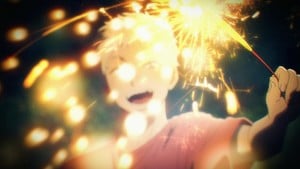The Summer Hikaru Died
Episode 6
by Steve Jones,
How would you rate episode 6 of
The Summer Hikaru Died ?
Community score: 4.3

Let me begin at the end of the episode and pose a question: could Yoshiki have been jealous that Hikaru considered eating someone other than him? I'm not saying the text explicitly supports this interpretation, but bear with me for a moment. Sex and food are both primordial motivating factors, and we've already seen how Hikaru and Yoshiki blend both sensations. Yoshiki's inner desires are also constantly at war with each other, so this doesn't have to be a rational response. At the start of the episode, he hesitates before attempting to dissuade his friends from staying at Hikaru's overnight. Was he trying to protect them, or did he want to keep Hikaru to himself? The framing of the shot reminds us of the bruise on his arm, but that functions as both a wound and, in a perverse way, a badge of honor. I think his instincts may be possessive. The bond he shares with Hikaru is as unique and irreplaceable as it gets, after all.
We continue to see Hikaru work on similarly spotty logic, or a lack thereof. He's a big and very dangerous puppy. When Asako susses him out, he's shocked. Caught off guard, his instincts take over, and he nearly kills her before Yoshiki interrupts him. Hikaru's words and body language are fascinating to watch after he lets Asako go. He instantly backs away, goes on the defensive, and seems to think better of it. When Yoshiki pushes the matter further, Hikaru resorts to the rhetoric that life and death are not as distinct to a supernatural creature like him. It's a fair point to bring up, especially in the context of Asako's flashback, but he sounds like a child who got caught with his hand in the cookie jar, arguing with his parents about his daily caloric needs. However, “correct” he may be, it's not germane to the actual problem.
This action reminds Yoshiki that he is dealing with a Swampman. The thought experiment referenced at the beginning of the episode is a real one devised by Donald Davidson, and I don't think I need to elaborate on its relevance to Hikaru's situation. In short, it argues that the creature would have to have been Hikaru to be Hikaru, so obviously he's different. We know that. I think the interesting quandary the anime homes in on is the effect of the Swampman on the people around him. If people realize they're dealing with a Swampman, would that materially change how they interface with him? Yoshiki both pretends things are normal and uses Hikaru's new anatomy and infatuation with him to his advantage. Even Asako is hesitant to realize that Hikaru has been replaced, instead concluding that he must be possessed. It's a subtle difference, but one that elides the more troubling and complicated reality. Perhaps, as animals with oversized brains, our desire to be loved and our fear of rocking the boat overpower our baser grasp on fight or flight.
Ironically, Asako is probably more primed to accept Hikaru for what he is than any other person in their friend group. There's a minute yet meaningful distinction between what her grandmother teaches her and what Rie previously told Yoshiki. Rie speaks with sensitivity in absolutes, warning Yoshiki that no good can come from mixing with Hikaru. Asako's grandmother, however, acknowledges that spirits can be good and people can be bad. Hikaru also perceives the continuity between the worlds of the living and the dead. Neither population is a monolith, and Asako witnesses firsthand as a scary blob of ectoplasm tries to stop her friend from getting hit by the runaway car. In other words, her grandmother recommends caution, not prejudice.
With that being said, Yoshiki still has every reason to be cautious around Hikaru. He doesn't get a straight answer about the old woman's murder, and he doesn't know what his friend's doppelganger is. Worse still, he realizes he may fundamentally never understand the monster's line of thinking, which is alien to how he perceives the world as an ordinary teen boy. But is he content being an ordinary teen boy? Playing with fireworks is an apt visual metaphor for Yoshiki's relationship with Hikaru, and it continues the series' trend of layering big themes onto quotidian objects.
Another example that stands out is our weekly check-in with choir practice. Chiaki Kobayashi mentions it in this interview, and you'll have to trust me when I say I've been meaning to bring it up. While there's nothing overtly untoward about these scenes, they're nevertheless unsettling. I think, for me, they emphasize the performative and ritualistic side of high school, and thus they do the same for the students' quotidian lives en masse. Both kids and adults are going through the motions and singing the notes on the page. The teacher doesn't care. The students don't care. But they continue to practice anyway. The absurdity present in Yoshiki's life isn't isolated to Hikaru. Normalcy is a brand of madness, and right now, Yoshiki is caught between which flavor of insanity he wants to ally himself with.
Rating:
The Summer Hikaru Died is currently streaming on Netflix.
Steve is on Bluesky for all of your posting needs. You can also catch them chatting about trash and treasure alike on This Week in Anime.
Disclosure: Kadokawa World Entertainment (KWE), a wholly owned subsidiary of Kadokawa Corporation, is the majority owner of Anime News Network, LLC. One or more of the companies mentioned in this article are part of the Kadokawa Group of Companies.
discuss this in the forum (15 posts) |
back to The Summer Hikaru Died
Episode Review homepage / archives